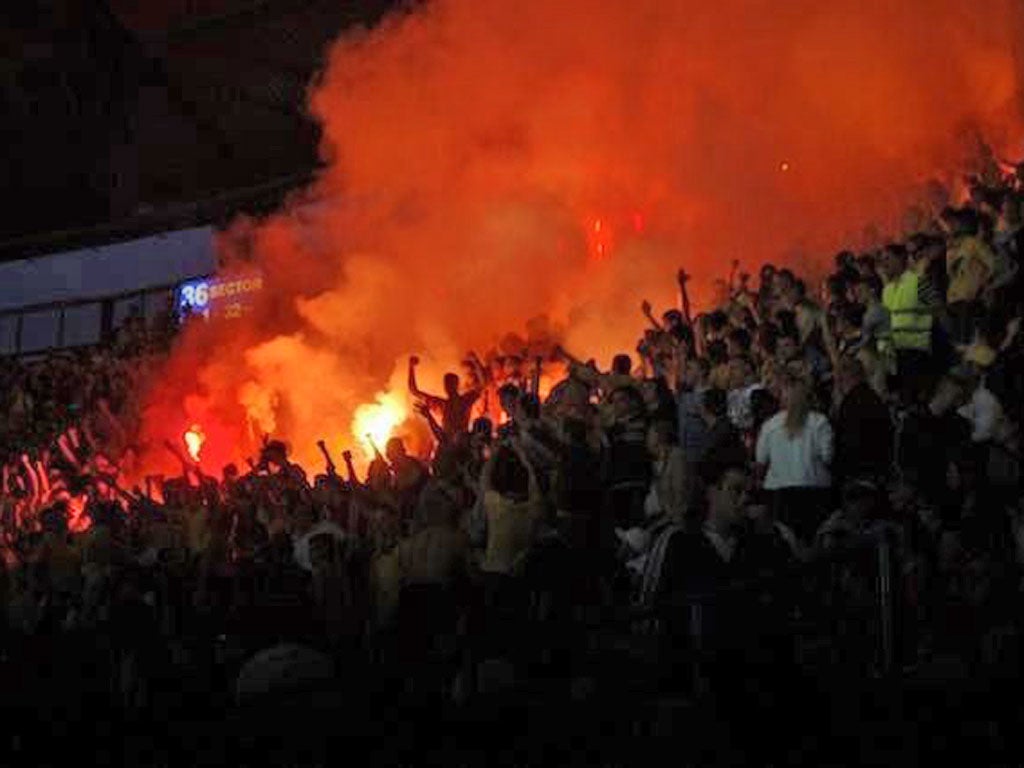Philip Hensher: Some things are more important than sport

It's unusual, to say the least, to hear a sporting figure advising fans not to go to a sporting event. But Sol Campbell, the footballer, had reason on his side for telling people to give Euro 2012, held this year in Poland and Ukraine, a miss.
He was being interviewed by BBC's Panorama programme, which had easily found footage of Ukraine's football fans making monkey noises at black players and singing anti-Semitic songs, and of Asian fans being savagely beaten by white Ukrainians. "Stay at home," the estimable Mr Campbell said. "Watch it on TV. Don't even risk it ... because you could end up coming back in a coffin."
Campbell had non-white fans in mind, but he could have gone further and told gay people not to go – they suffer routine persecution in Ukraine. Comically, in 2007, the leader of a committee on human rights in the Ukraine parliament called gay men "perverts" to be prevented. In a poll that year, 81.3 per cent of those Ukrainians asked said that gay relations were "never acceptable". Perhaps, too, women might want to avoid the country – Mykola Azarov, the Prime Minister, explained in 2010 that he wouldn't want to appoint any women as ministers because "reforms do not fall into women's competence".
All this raises two questions. First, how bad does a situation have to be before sport stops considering itself the most important, or the only, question? Secondly, what on earth was Uefa thinking of in awarding a tournament of this sort to a nation where the safety and dignity of many thousands of ordinary people are not respected?
The same day as Mr Campbell's comments, a remarkable photograph was published of climbers ascending Mount Everest. One had heard, anecdotally, that the number of people ascending the mountain was now so great that, in suitable weather, climbers were forming queues. One might have thought that was an exaggeration, but this photograph showed dozens of climbers forming an orderly queue. The numbers involved now give a different aspect to the dangers of climbing the mountain. In one notorious case, a British climber, David Sharp, who had collapsed and was dying, was passed by 40 other climbers who refused to help. Sir Edmund Hillary called their attitude "horrifying". One more modern mountaineer, Dan Mazur, has said: "There are times when you literally have to step over somebody's body to get to the top."
Have to? The demands of sport have grown excessive, so that it seems remarkable, and even rather distinguished, to abandon a sporting goal to help the dying, or to decide not to go to a sporting competition in a barbaric country. The pinnacle of this extraordinary attitude is going to come with the Olympics. Shortly, Syrian athletes and officials are to be admitted, and may even compete under their flag. "Only the [Syrian] Olympic officials have been invited because they are independent," a spokesman implausibly said. The Syrian Olympic Committee has yet to be banned, and the international organisation is still keeping up its pretence that, where it says so, sport has nothing to do with politics. "We will do everything we can to ensure athletes are not affected by these events," one international spokesman said.
All too late, and missing the point. The significance of sports has a limit, and beyond that there is something – or there ought to be something – called humanity.
Calm down Gareth, it's not an insult to be gay
The choirmaster Gareth Malone – married with a child – has spoken of his irritation and embarrassment at being taken repeatedly to be a gay man. "Any display of emotion, crying, heart, feeling" mark out a man as gay, he said – something which he wanted to put right.
It happens to me, too, without causing any annoyance. People regularly make the assumption that I'm heterosexual. The other day, a children's novelist naively asked me what my non-existent wife thought about something. More unexpectedly, sometimes in Germany I'm asked if I'm Jewish – my name has a Yiddish flavour to German ears. In these circumstances, I say in a tranquil way, "No, I'm not heterosexual" or "No, I'm not Jewish", in much the same way that you might say: "Actually, I was born in London." At some point, no doubt, being mistaken for a gay person will not be the cause of annoyance to heterosexuals. It will be just like saying: "Oh – I thought you were left-handed for some reason." But for the moment, it does seem to cause rage in even very well-meaning people like Mr Malone.

Join our commenting forum
Join thought-provoking conversations, follow other Independent readers and see their replies
Comments